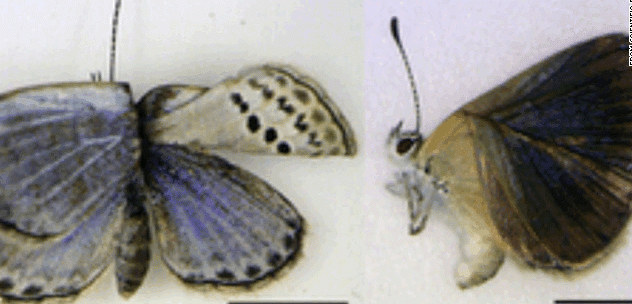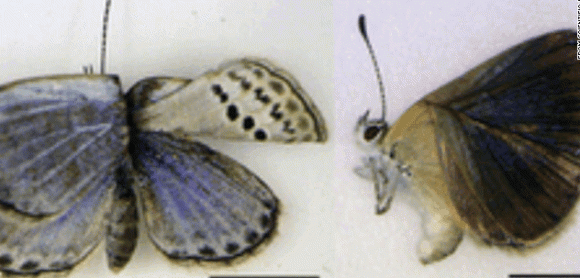Mutant Butterflies Emerge In The Wake Of The Fukushima Nuclear Disaster
i'll just leave this here

Although the human impact of the Fukushima Daiichi nuclear disaster was limited to physical injuries, excessive radiation exposure and the possibility that cancer could rear its ugly head in the future, the meltdown’s toll on the environment has remained a mystery — until now. In an attempt to measure the consequences of the nuclear accident, scientists studied butterflies collected from Fukushima last year, ultimately discovering a series of biological adaptations to increased levels of environmental radiation that does not bode well for local wildlife.
According to a research paper published in Scientific Reports, butterflies were chosen as a measure for environmental damage because their “wing colour patterns are sensitive to environmental changes,” and because in general, they are considered “useful environmental indicators.” During their study, scientists discovered a series of mutations in their butterfly sample, including “broken or wrinkled wings, changes in wing size, color pattern changes, and spots disappearing or increasing on the butterflies.”
Unfortunately, while 28% of the butterflies showed signs of mutation, a whopping 52% of their offspring featured similar physical abnormalities. These findings applied not only to the butterfly offspring bred in captivity, but also to a second sample pool collected in September, 5 months after the original samples were captured. The study concluded that “all of these results suggest that radiation caused adverse effects at the physiological and genetic levels.”
Although these findings suggests that the environmental damage in the wake of the Fukushima disaster could take a while to fully come to fruition, the scientists behind this study have assured the world that these butterfly mutations don’t have much bearing on humans: according to Joji Otaki, an associate professor at the University of the Ryukyus in Okinawa and one of the researchers, “humans are totally different from butterflies and they should be far more resistant” to radiation.
While the victims of the Fukushima disaster can thank their lucky stars that their offspring will likely be alright, the same cannot be said for the next generation of local wildlife, a sobering reminder of the often devastating costs of technological development.
Are you following The Mary Sue on Twitter, Facebook, Tumblr, Pinterest, & Google +?
Have a tip we should know? [email protected]
